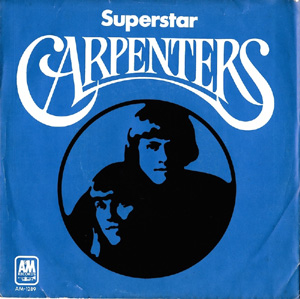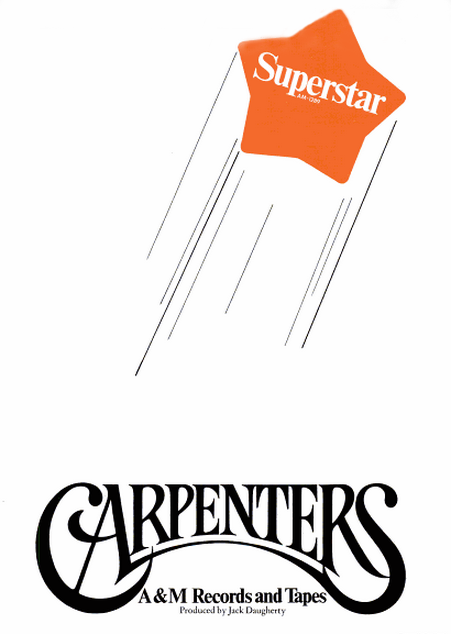
(Leon Russell, Bonnie Bramlett, Delaney Bramlett) Skyhill Publishing Co./Delbon Publishing BMI 3:49
A&M 1289 Single released: 8/12/71
Billboard #2, 9/4/71
b/w Bless The Beasts And Children
Original album mix:
– CARPENTERS (Tan album) LP and Remastered Classic version of the CD
– BY REQUEST
– CARPENTERS COLLECTED
– CARPENTERS-THE COMPLETE SINGLES
– ESSENTIAL COLLECTION
– JAPANESE SINGLE BOX
– THE NATION’S FAVOURITE CARPENTERS SONGS (UK)
– ULTIMATE COLLECTION (NL)
1973 remix: stereo soundstage altered, opening harp centered, segues into “Rainy Days…”
– THE SINGLES 1969-1973 Remastered Classic
– THE SINGLES 1969-1973 original A&M CD, slightly sped up
– YESTERDAY ONCE MORE (84)
– YESTERDAY ONCE MORE (UK), slightly sped up
1985 remix: stereo piano and reverb added, opening harp left
– A&M GOLD SERIES VOL 1
– A&M NEW GOLD SERIES VOL 1 (1990)
– A&M GOLD SERIES (1991) and STARTRAX (AUS)
– ANTHOLOGY (89)
– CARPENTERS (Tan album) original A&M CD
– THE CARPENTERS COLLECTION (THEIR GREATEST HITS)
– CLASSICS VOL 2 and YESTERDAY ONCE MORE (85)
– ONLY YESTERDAY-THEIR GREATEST HITS
– REMINISCING
1985 remix reversed stereo:
– O MELHOR DE CARPENTERS-ONLY YESTERDAY (BRZ)
– A ARTE DE CARPENTERS
1990 remix: minor tweaking to the 1985 remix, opening harp more centered
– FROM THE TOP
1991 remix: more minor tweaking, opening harp slightly right, vocals less buried in the mix
– ANTHOLOGY (97)
– BEST OF BEST+
– THE BEST OF CARPENTERS (Brazil)
– CARPENTERS BEST VOL. 1
– CARPENTERS COLLECTION (Time-Life)
– GOLD (JP)
– GOLD (UK)
– GOLD (US)
– INTERPRETATIONS (UK)
– INTERPRETATIONS (US)
– LOVE SONGS
– MAGICAL MEMORIES OF THE CARPENTERS
– THE SINGLES 1969-1981
– SWEET MEMORY those days
– THEIR GREATEST HITS AND FINEST PERFORMANCES (Readers Digest)
– TWENTY TWO HITS OF THE CARPENTERS
– YESTERDAY ONCE MORE (98)
– YESTERDAY ONCE MORE (NL)
2004 SACD stereo remix:
– 20/20 BEST OF BEST SELECTION
– 40/40 BEST SELECTION (JP)
– 40/40 (US)
– ICON
– THE SINGLES 1969-1981 SACD on SACD stereo layer and CD Audio layer
– ULTIMATE COLLECTION (UK)
2004 SACD 5.1 surround mix:
– THE SINGLES 1969-1981 on surround layer
Quad remix:
– CARPENTERS (tan album) Quad 8-track
– THE SINGLES 1969-1973 Quad LP and 8-track
Karaoke version: backing track to the 1991 remix
– ORIGINAL MASTER KARAOKE-YESTERDAY ONCE MORE
Live versions:
– LIVE IN JAPAN
– within the medley of LIVE AT THE PALLADIUM
2018 RPO Mix: enhanced version recorded at Abbey Road Studios with the Royal Philharmonic Orchestra
– CARPENTERS WITH THE ROYAL PHILHARMONIC ORCHESTRA
Chris May says:
As the oboe decrescendoes in bar 5, Richard brings in a three-part french horn line, which ends on an F minor (in second inversion) in bar 8. Prior to this, you won’t find this last chord anywhere but the original mix off of the tan album (although the SACD features this original 3-part chord, elimnating the key-horns). In ’85, Richard added 3 more horn voices to the track using Kurzweil horns, putting the 10th on the botttom; and it is this version that was pressed onto all CD versions of the tune. “We’d play Vegas a couple of times a year,” Richard explains, “and our conductor in Vegas, Dick Polumby, came up with this idea. He said, ‘have you ever tried filling out the arrangement?’ And he played it for me on the piano and it was beautiful, so I said ‘do it!’ So he wrote that into the charts and from then on – this was ’72 or ’73 – we did it that way. When we remixed the song for the “Yesterday Once More” album, I didn’t want to hire a band just for that one chord on the remix, so I played the Kurzweil, adding it to the existing horns.”
Regarding the SACD surround mix: The best way to describe this remix is 80% original mix, 20% additional recording (instrumentation from ’73/’85). To sum it up, for the most part you are listening to the original with incredible separation!
(from Daniel Levitin:)
A case in point is the Leon Russell/Bonnie Bramlett composition, Superstar, one of Carpenter’s most beautiful arrangements. The song was first recorded on Joe Cocker’s Mad Dogs and Englishmanalbum with Rita Coolidge on vocals and Leon Russell on piano. But Richard first heard its potential as a Carpenters single when a then barely known Bette Midler sang it on the Johnny Carson show. Richard’s arrangement introduced lots of new music that has become so identified with the song, so inseparable from the melody, that when people go back and hear the other versions, they’re overwhelmed by the sense that something is missing from them.
Carpenter starts of with a harp glissando using the Eb (V) major scale (the song is in Ab). The glis starts on F and ends on G a 9th above, as the strings come in on an F (vi) minor chord. Just as the harp reaches its G, Richard introduces an opening theme he wrote, played on the oboe. At first the theme anticipates the first few notes of the vocal melody which enters 9 bars later, and then it evolves to an entirely new melody, a sort of variation of the main vocal line.
As the oboe decrescendoes in bar 5, Richard brings in a three-part french horn line, which ends on an F minor (in second inversion) in bar 8. But you won’t find this last chord anywhere but the old vinyl version of their second album; Richard recently added 3 more horn voices to the track using Kurzweil horns, putting the 10th on the botttom; and it is this version that was pressed onto all CD versions of the tune. “We’d play Vegas a couple of times a year,” Richard explains, “and our conductor in Vegas, Dick Polumby, came up with this idea. He said, ‘have you ever tried filling out the arrangement?’ And he played it for me on the piano and it was beautiful, so I said ‘do it!’ So he wrote that into the charts and from then on – this was ’72 or ’73 – we did it that way. When we remixed the song for the Yesterday Once More album, I didn’t want to hire a band just for that one chord on the remix, so I played the Kurzweil, adding it to the existing horns.”
Notice next, in bar 9 [00:20 on the CD], how Richard sets up the main rhythmic theme for the song, a dotted quarter-eighth-half note rhythm on the kick drum and bass, doubled on the left hand of the piano for a really fat, and commanding, sound. Enhancing the fatness of the sound is the way the bass comes into bar 9 by dropping an octave – when Joe Osborn finally hits his low F from an octave above, it sounds like lowest note you’ve ever heard.
This introduction to the tune is very carefully crafted to set the mood, and uses orchestral instruments to provide a lush texture. Richard’s opening oboe theme is all most people need to hear to recognize the song. Two groups recently covered the song – Sonic Youth (on the If I Were A Carpenter tribute album) and Chrissie Hynde (under the pseudo-band name Superfan, from the Wayne’s World soundtrack album) – and they left Richard’s intro line untouched.
Richard’s use of “call and response” lines is also classic, and typical of his approach to creating cohesion between different instrumental parts. At the top of the second verse [00:52] Karen sings the lyric “your guitar” on the notes G-F-C (recognize this from the oboe intro?), and this line is then immediately echoed by the violins.
For the chorus, RC pulls out all the stops. Hal Blaine’s drum fills coming into bar 26 (“B” on the chart) are accented by Richard’s frenetic electric piano fills. A tambourine plays 16th notes throughout the chorus, adding to the rhythmic build. Karen sings the first line of the chorus, “Don’t you remember you told me you loved me baby,” which is answered by the trumpets in bar 27 with a horn fill that is one of the most recognizable signature lines in all of pop music, filling the space between vocal lines with a bright, Tijuana-brass type fanfare. To many, it would be unthinkable to perform the song without this line. Although Chrissie Hynde left it out, Sonic Youth kept it, transferring it to piano.
Coming out of the first chorus, a 10 bar interlude parallels the intro, complete with harp glissando [1:35] and the obligatto oboe. Notice that this second time through the theme, Richard’s grand piano echoes the oboe line in octaves in “call and response” style.
Another interesting part of the track is Karen’s vocal performance. Listen to the way she sings the words “far away” (at from 00:34 – 00:37 on the CD) – while holding the word “away” she brings out a subtone in her voice that conveys deep and troublesome emotions. Richard knew her range incredibly well, and his choice of key made moments such as this possible. Karen was also a master at phrasing – in the subsequent words, “I fell in love with you,” she sings just behind the beat – not unlike Sinatra – playing around with the time to impart more depth to the vocal.
Original promotional ad for this single:

